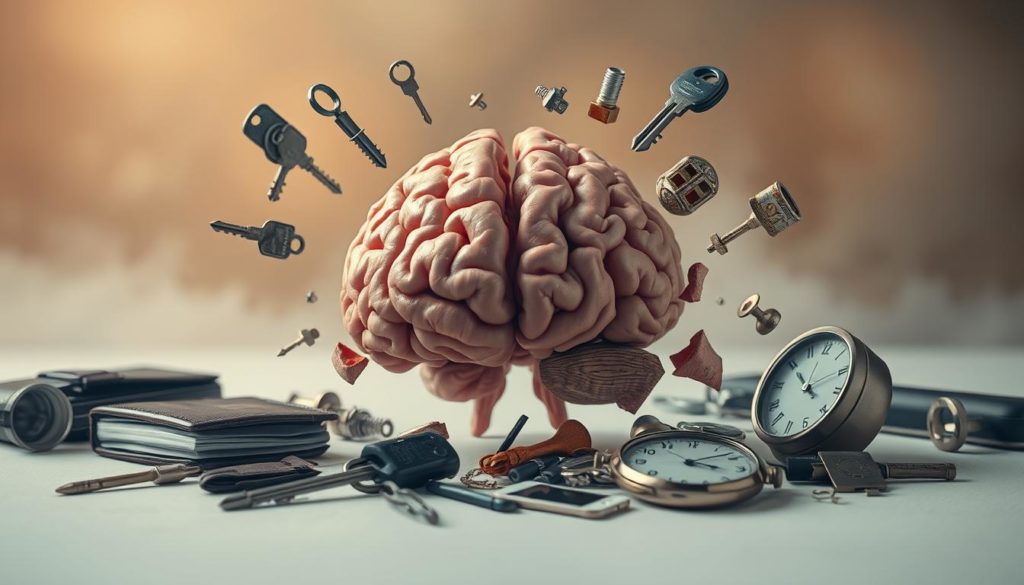Did you know that almost 1 in 9 Americans over 65 have Alzheimer’s disease? Awareness of brain health is growing, as is fear of dementia. It’s fine to forget your keys sometimes. But if you keep forgetting things, it might be an early sign of Alzheimer’s. This kind of dementia usually starts slowly, mainly affecting older people. But it’s not only about getting older. Alzheimer’s risk also comes from family history and lifestyle choices. Things like not moving much and eating poorly can increase your risk.
It’s very important to know these early signs. Spotting them early can really help manage the disease. Knowing what to look for can help keep your brain healthy and improve your life.
Common Early Warning Signs of Alzheimer’s Disease
It’s crucial to spot Alzheimer’s early signs for timely action. A big warning sign is memory loss that messes with daily tasks. It often causes a greater need for things like notes.
Memory Loss
Memory problems that disturb daily life are a key early sign of Alzheimer’s. People might repeat things a lot or need things like notes or electronic reminders more than usual. This is different from sometimes forgetting things as we get older.
Visual and Spatial Challenges
Problems with seeing properly or judging space and distance are also early signs. This can mean having trouble knowing how far away something is or getting mixed up with colors and shapes. Sometimes, people even see things that aren’t there or don’t recognize common objects.

Changes in Mood or Personality
Alzheimer’s can also change how a person feels or acts. They might have big changes in their feelings or act very differently. This can include getting confused, suspicious, or not wanting to hang out with friends like before. These changes are more noticeable in places that used to feel safe.
Here’s a rundown of these early signs:
| Early Sign | Description |
|---|---|
| Memory Loss | Difficulties in daily life, more need for help, asking the same things over. |
| Visual and Spatial Challenges | Problems with seeing depth, seeing things that aren’t there, not recognizing things. |
| Changes in Mood or Personality | Shifting moods, feeling confused, not wanting to be social. |
Cognitive Decline and Everyday Challenges
As Alzheimer’s disease gets worse, the cognitive decline becomes clearer. It impacts daily life aspects heavily. Those facing Alzheimer’s difficulties find it hard to do simple tasks. Realizing these signs early is very important.

Here are some everyday challenges hinting at brain function impairment:
- Having trouble with familiar tasks.
- Being confused about time or places.
- Making poor choices.
- Losing things and not being able to find them again.
- Not taking care of oneself like before.
Knowing about these problems helps in recognizing Alzheimer’s early. A clear sign of cognitive decline is when making everyday choices becomes harder.
Below is a table showing how cognitive decline affects daily life differently:
| Aspect | Normal Aging | Alzheimer’s Impact |
|---|---|---|
| Memory | Sometimes forgetting names or plans. | Often forgetting without being able to remember recent stuff. |
| Tasks | Now and then needing help with new technology or tasks. | Finding it hard to do easy tasks like paying bills. |
| Spatial Awareness | May have trouble with complicated directions. | Getting lost in well-known places. |
| Judgment | Occasionally making a bad choice. | Often making poor decisions. |
| Hygiene | Keeping up with grooming, with few misses. | Ignores personal care and cleanliness. |
Spotting these differences is vital in offering early help. It supports those struggling with Alzheimer’s difficulties. It also stops more brain function impairment.
Recognizing Memory Loss Beyond Normal Aging
Telling apart normal aging from serious conditions like Alzheimer’s disease is tough. Some memory loss with age is normal, but certain symptoms might mean it’s time to look deeper. Accurately identifying memory issues is crucial.
Understanding the Difference
It’s vital to know the difference between normal memory loss and Alzheimer’s disease. Forgetting things like the date now and then is common and usually doesn’t affect daily life. But, when forgetting becomes frequent and interferes with daily tasks, it could be Alzheimer’s. Early diagnosis can help manage symptoms better.
Examples of Anomalous Memory Lapses
Anomalous memory lapses aren’t just regular forgetfulness. Key signs include forgetting personal history, major events, or asking the same things over and over. These are not normal aging signs but could be early Alzheimer’s disease indicators. Recognizing and acting on these signs early can help manage the condition effectively.
Alzheimer’s Symptoms: When to Seek Help
Knowing when to seek help for Alzheimer’s is crucial. Spotting early signs is key to managing the disease well. Often, symptoms are ignored until they start affecting daily life. But, getting help early can greatly improve life for those with Alzheimer’s.
“Symptoms like memory loss and trouble with familiar tasks shouldn’t be overlooked. It’s important to see a healthcare provider quickly to talk about any worries.”
If Alzheimer’s symptoms disrupt daily routines or change behavior, it’s time for professional advice. An early cognitive check can catch the condition early. This leads to better management of the disease.
There are several important reasons to get medical help:
- Early diagnosis and intervention can slow the disease’s progress.
- Access to treatment and trials that might not be available later.
- Future planning for health and personal matters.
- Potential long-term cost savings by dealing with symptoms early.
Knowing when to get medical help is crucial for an early diagnosis. It also helps improve life quality with timely support and interventions.
Navigating Disorientation and Confusion
Disorientation in Alzheimer’s brings big challenges. It makes daily tasks hard and confusing. Knowing what causes confusion helps in recognizing Alzheimer’s symptoms early. This is key to manage thinking problems well.
People with Alzheimer’s might feel lost in places they know. They also struggle to tell apart past and present. They might get lost driving familiar roads. Or get mixed up about what day it is.
Common Triggers and Instances
Triggers of confusion in Alzheimer’s include new places, changes in daily habits, and poor sleep. These can make cognitive problems worse. Spotting these triggers is essential. It helps give the right care and might mean it’s time for a check-up on brain health.
Subtle Behavioral Changes to Watch For
Finding Alzheimer’s early can be hard because small behavior changes come first. These changes might include not joining in social activities like before. Or even avoiding gatherings completely. Spotting these signs is key.
Seeing someone drive differently can also warn us. They might get mixed up on well-known roads. Or they might not want to drive at all. Staying only in places they know well is another clue.
Small behavior shifts, like acting on impulse or getting upset easily, are important to notice. It’s vital for those caring for them to keep an eye out. Knowing these behavioral signs of Alzheimer’s helps catch it early. This can lead to better care sooner.
| Behavioral Signs | Possible Triggers |
|---|---|
| Withdrawing from social activities | Feeling overwhelmed or self-conscious |
| Changes in driving habits | Confusion or fear of getting lost |
| Restriction to familiar environments | Uncertainty or disorientation |
Impact on Daily Activities
Alzheimer’s makes everyday tasks hard. People struggle with managing money and keeping a schedule. They face many obstacles.
Challenges in Planning
Planning difficulties stand out as a big problem. Folks find meal planning and appointment handling tough. They can’t follow simple project steps.
These issues make daily life a challenge. They also affect job duties.
Trouble with Routine Tasks
Routine task challenges pose a big challenge. Activities like driving and organizing become tough. Even cooking is harder.
This decline shows the deep impact of Alzheimer’s. It underlines the need for support and awareness.
| Daily Activity | Challenges Faced |
|---|---|
| Meal Planning | Difficulty organizing ingredients, following recipes |
| Managing Finances | Trouble with budgeting, remembering bills |
| Navigation | Confusion with familiar routes, destinations |
The Role of Mood Swings and Emotional Changes
Alzheimer’s disease brings big emotional changes and mood swings. People with Alzheimer’s might get angry quickly or feel very sad. It’s important to know about these changes to help and support them.
These emotional shifts vary a lot. Someone might feel restless, get agitated easily, or get upset faster. These signs show the disease is getting worse. They also make daily tasks harder to do.
Dealing with Alzheimer’s means seeing personality changes. A calm person might start getting frustrated easily. Or a happy person becomes sad or anxious. These changes are part of the disease. It’s key to handle them with care.
Looking closer at how mood and emotional changes affect those with Alzheimer’s is helpful. Below is a list showing these impacts:
| Emotional Changes | Mood Swings | Personality Shifts |
|---|---|---|
| Anxiety and restlessness | Sudden anger outbursts | Cheerfulness to sadness |
| Depression | Increased irritability | Calmness to frustration |
| Rapid mood shifts | Episodes of confusion | Social withdrawal |
In summary, it’s key to understand mood and emotional changes in Alzheimer’s patients for caregivers. They should be patient and empathetic. And they need good strategies for these hard symptoms. Helping with these personality changes can make life better for people with Alzheimer’s.
Communication Difficulties as Early Signs
One lesser-known sign of Alzheimer’s is trouble with talking or understanding. These issues can start off small, but they’re key to notice early on. Spotting them can help get the right help and advice quickly.
Challenges in Following Conversations
Early on, people with Alzheimer’s find chats difficult. They may not get the flow of a conversation or forget the topic. This gets even harder in groups with many people talking.
Struggles with Vocabulary
Having trouble with words is a common sign. Someone might not find the right word, using “thing” or “what’s-it-called” instead. These struggles with words can be upsetting. It shows why spotting these signs early matters a lot.
FAQ
What are the early signs of Alzheimer’s symptoms?
Early signs include frequent memory loss that impacts daily life. People may also face confusion and trouble understanding visuals and spaces. Mood swings and changes in behavior, along with communication difficulties, are common.
Are memory lapses normal as we age?
Yes, forgetting things sometimes is normal as we get older. But, when memory loss is severe and affects daily life, it might be Alzheimer’s. It’s important to know the difference between normal forgetfulness and serious symptoms.
What are some common early warning signs of Alzheimer’s disease?
The common early signs are serious memory loss, problems with seeing spaces correctly, and mood changes. Behavioral or personality changes are also warning signs.
Can visual and spatial challenges be related to Alzheimer’s?
Yes, having trouble judging distance or recognizing objects can signal Alzheimer’s. Difficulty differentiating colors is also a related challenge.
What kind of changes in mood or personality might signal Alzheimer’s disease?
Signs include becoming confused or suspicious. People may also pull away from friends and feel more anxious. It’s not usual if someone gets unexpectedly aggressive or agitated.
How does cognitive decline affect everyday challenges?
Alzheimer’s makes daily tasks hard. Forgetting routines or how to care for oneself can happen. Decision-making becomes difficult as the disease gets worse.
How can you recognize memory loss beyond normal aging?
Look for frequent forgetfulness that disrupts daily tasks. Forgetting important personal details or asking the same things over and over is a sign.
When should you seek medical help for Alzheimer’s symptoms?
Get medical help when persistent memory loss affects daily activities. Also, if there are mood and behavior changes. Early help can lead to better management plans.
What are common triggers of disorientation and confusion in Alzheimer’s patients?
Being in new places, losing track of time, and mixing up past and present can trigger confusion. This may result in getting lost or difficulty navigating.
What subtle behavioral changes should you watch for as signs of Alzheimer’s?
Early signs include pulling back from socializing, changing the way one drives, and sticking to known places. These changes can point to Alzheimer’s.
How does Alzheimer’s impact daily activities?
It affects planning, working with numbers, and following routines. People might struggle with budgets, get lost easily, and have issues with simple tasks.
What mood swings and emotional changes might accompany Alzheimer’s disease?
Individuals may go through anger, restlessness, or feel anxious and depressed. These changes can challenge both those with Alzheimer’s and their caregivers.
What communication difficulties are early signs of Alzheimer’s?
Struggling to follow conversations, finding the right words, or naming objects are early signs. Understanding these issues is key to seeking help.


